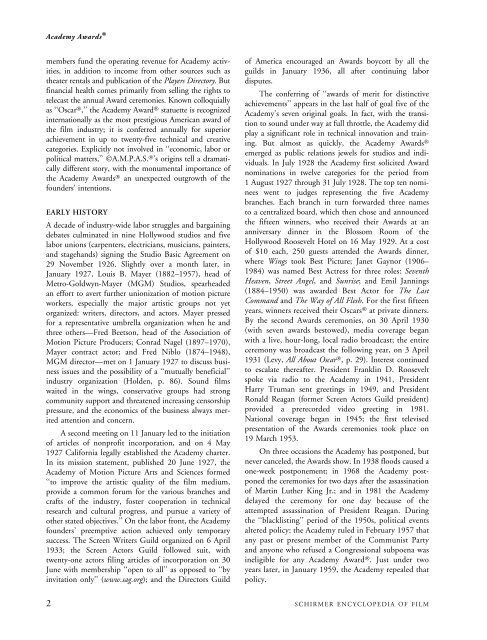Schirmer Encyclopedia of Film
Schirmer Encyclopedia of Film
Schirmer Encyclopedia of Film
You also want an ePaper? Increase the reach of your titles
YUMPU automatically turns print PDFs into web optimized ePapers that Google loves.
Academy Awards Ò<br />
members fund the operating revenue for Academy activities,<br />
in addition to income from other sources such as<br />
theater rentals and publication <strong>of</strong> the Players Directory.But<br />
financial health comes primarily from selling the rights to<br />
telecast the annual Award ceremonies. Known colloquially<br />
as ‘‘Oscar Ò,’’ the Academy Award Ò statuette is recognized<br />
internationally as the most prestigious American award <strong>of</strong><br />
the film industry; it is conferred annually for superior<br />
achievement in up to twenty-five technical and creative<br />
categories. Explicitly not involved in ‘‘economic, labor or<br />
political matters,’’ ÓA.M.P.A.S. Ò’s origins tell a dramatically<br />
different story, with the monumental importance <strong>of</strong><br />
the Academy Awards Ò an unexpected outgrowth <strong>of</strong> the<br />
founders’ intentions.<br />
EARLY HISTORY<br />
A decade <strong>of</strong> industry-wide labor struggles and bargaining<br />
debates culminated in nine Hollywood studios and five<br />
labor unions (carpenters, electricians, musicians, painters,<br />
and stagehands) signing the Studio Basic Agreement on<br />
29 November 1926. Slightly over a month later, in<br />
January 1927, Louis B. Mayer (1882–1957), head <strong>of</strong><br />
Metro-Goldwyn-Mayer (MGM) Studios, spearheaded<br />
an effort to avert further unionization <strong>of</strong> motion picture<br />
workers, especially the major artistic groups not yet<br />
organized: writers, directors, and actors. Mayer pressed<br />
for a representative umbrella organization when he and<br />
three others—Fred Beetson, head <strong>of</strong> the Association <strong>of</strong><br />
Motion Picture Producers; Conrad Nagel (1897–1970),<br />
Mayer contract actor; and Fred Niblo (1874–1948),<br />
MGM director—met on 1 January 1927 to discuss business<br />
issues and the possibility <strong>of</strong> a ‘‘mutually beneficial’’<br />
industry organization (Holden, p. 86). Sound films<br />
waited in the wings, conservative groups had strong<br />
community support and threatened increasing censorship<br />
pressure, and the economics <strong>of</strong> the business always merited<br />
attention and concern.<br />
A second meeting on 11 January led to the initiation<br />
<strong>of</strong> articles <strong>of</strong> nonpr<strong>of</strong>it incorporation, and on 4 May<br />
1927 California legally established the Academy charter.<br />
In its mission statement, published 20 June 1927, the<br />
Academy <strong>of</strong> Motion Picture Arts and Sciences formed<br />
‘‘to improve the artistic quality <strong>of</strong> the film medium,<br />
provide a common forum for the various branches and<br />
crafts <strong>of</strong> the industry, foster cooperation in technical<br />
research and cultural progress, and pursue a variety <strong>of</strong><br />
other stated objectives.’’ On the labor front, the Academy<br />
founders’ preemptive action achieved only temporary<br />
success. The Screen Writers Guild organized on 6 April<br />
1933; the Screen Actors Guild followed suit, with<br />
twenty-one actors filing articles <strong>of</strong> incorporation on 30<br />
June with membership ‘‘open to all’’ as opposed to ‘‘by<br />
invitation only’’ (www.sag.org); and the Directors Guild<br />
<strong>of</strong> America encouraged an Awards boycott by all the<br />
guilds in January 1936, all after continuing labor<br />
disputes.<br />
The conferring <strong>of</strong> ‘‘awards <strong>of</strong> merit for distinctive<br />
achievements’’ appears in the last half <strong>of</strong> goal five <strong>of</strong> the<br />
Academy’s seven original goals. In fact, with the transition<br />
to sound under way at full throttle, the Academy did<br />
play a significant role in technical innovation and training.<br />
But almost as quickly, the Academy AwardsÒ emerged as public relations jewels for studios and individuals.<br />
In July 1928 the Academy first solicited Award<br />
nominations in twelve categories for the period from<br />
1 August 1927 through 31 July 1928. The top ten nominees<br />
went to judges representing the five Academy<br />
branches. Each branch in turn forwarded three names<br />
to a centralized board, which then chose and announced<br />
the fifteen winners, who received their Awards at an<br />
anniversary dinner in the Blossom Room <strong>of</strong> the<br />
Hollywood Roosevelt Hotel on 16 May 1929. At a cost<br />
<strong>of</strong> $10 each, 250 guests attended the Awards dinner,<br />
where Wings took Best Picture; Janet Gaynor (1906–<br />
1984) was named Best Actress for three roles: Seventh<br />
Heaven, Street Angel, andSunrise; and Emil Jannings<br />
(1884–1950) was awarded Best Actor for The Last<br />
Command and The Way <strong>of</strong> All Flesh. For the first fifteen<br />
years, winners received their OscarsÒ at private dinners.<br />
By the second Awards ceremonies, on 30 April 1930<br />
(with seven awards bestowed), media coverage began<br />
with a live, hour-long, local radio broadcast; the entire<br />
ceremony was broadcast the following year, on 3 April<br />
1931 (Levy, All About OscarÒ, p. 29). Interest continued<br />
to escalate thereafter. President Franklin D. Roosevelt<br />
spoke via radio to the Academy in 1941, President<br />
Harry Truman sent greetings in 1949, and President<br />
Ronald Reagan (former Screen Actors Guild president)<br />
provided a prerecorded video greeting in 1981.<br />
National coverage began in 1945; the first televised<br />
presentation <strong>of</strong> the Awards ceremonies took place on<br />
19 March 1953.<br />
On three occasions the Academy has postponed, but<br />
never canceled, the Awards show. In 1938 floods caused a<br />
one-week postponement; in 1968 the Academy postponed<br />
the ceremonies for two days after the assassination<br />
<strong>of</strong> Martin Luther King Jr.; and in 1981 the Academy<br />
delayed the ceremony for one day because <strong>of</strong> the<br />
attempted assassination <strong>of</strong> President Reagan. During<br />
the ‘‘blacklisting’’ period <strong>of</strong> the 1950s, political events<br />
altered policy: the Academy ruled in February 1957 that<br />
any past or present member <strong>of</strong> the Communist Party<br />
and anyone who refused a Congressional subpoena was<br />
ineligible for any Academy AwardÒ. Just under two<br />
years later, in January 1959, the Academy repealed that<br />
policy.<br />
2 SCHIRMER ENCYCLOPEDIA OF FILM
















